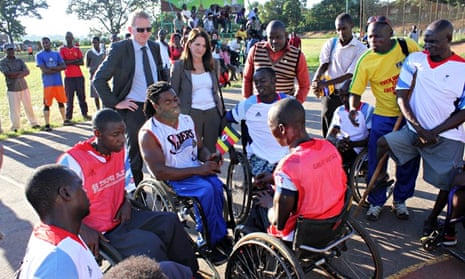The hundreds of millions of people living with disabilities in developing countries will remain invisible unless the world dramatically improves its data collection on disability, the UK’s parliamentary undersecretary for international development has warned.
Speaking at a conference in London on Thursday, Lynne Featherstone called on donors, civil society organisations and academics to address the issue by agreeing on a single, standardised method of collecting information.
“It’s a sad truth that in many developing countries people with disabilities simply don’t count,” she said.
“No data is collected on their disabilities nor their abilities, so it’s as if they just don’t exist.”
According to World Health Organisation and World Bank figures, about 1 billion people – 15% of the world’s population – are disabled. The definition of disability under the UN convention on the rights of persons with disabilities encompasses a wide range of impairments – physical, sensory, intellectual and mental health – but with a common experience of stigma and exclusion.
Featherstone said the absence of concrete evidence on disability was making it far too easy for governments and others to ignore those who were already among the most neglected in society.
She added: “As we prepare for the post-2015 development framework and the principle of ‘leav[ing] no one behind’, we must be sure that everyone is accounted for – this includes the 1 billion-plus people living with disability. Only by having the right information from the start will we be able to do this properly.”
The Department for International Development (DfID) said that differing definitions of disability, combined with inconsistent information-gathering, had created a gap in reliable global disability data.
That lack of evidence, it added, had stopped governments and others from taking into account the needs of people with disabilities when planning basic services and development programmes.
Those attending the disability data conference were urged to adopt the UN’s Washington Group questions as a single measure of disability that can be fitted into other questionnaires and serve as a benchmark against which disability can be measured.
Akiko Ito, chief of the secretariat for the UN convention on the rights of persons with disabilities, described the harmonisation of disability statistics as “the essential condition for an inclusive post-2015 development framework”, while Professor Nora Groce, director of the Leonard Cheshire disability and inclusive development centre, said: “The only way we can better understand the barriers disabled people face and how to address these is by ensuring that we have the right data available.”
In a report earlier this year, the international development committee stressed the need for a disability strategy to be incorporated into the UK’s development programmes. Its chair, Sir Malcolm Bruce, said: “Disabled people in developing countries are the poorest of the poor: if we are serious about tackling extreme poverty, our development work has to target them.”
Figures from University College London suggest that 80% of the world’s disabled people live in developing countries. According to DfID research, those with disabilities are more likely to fall into poverty and face discrimination.
